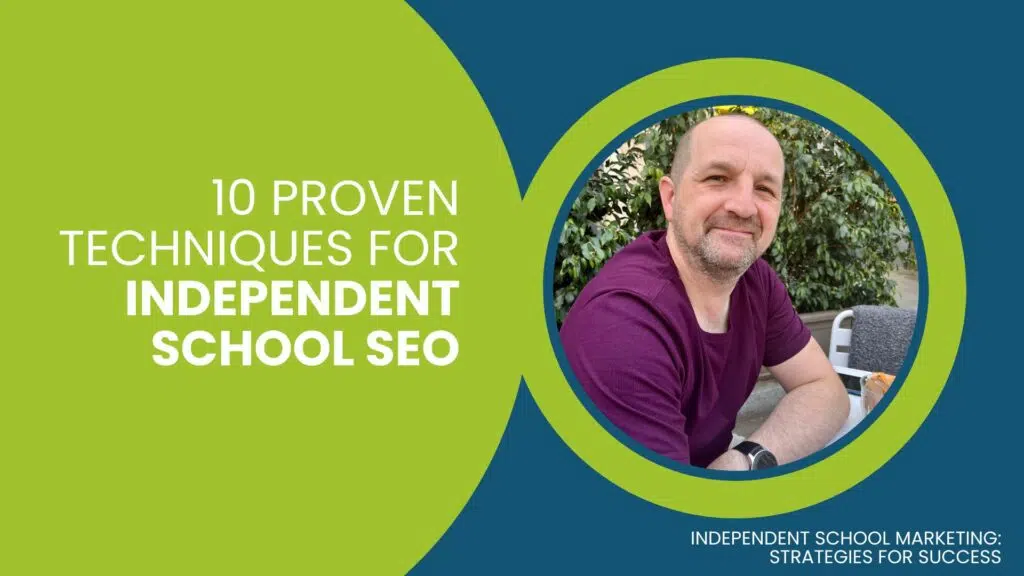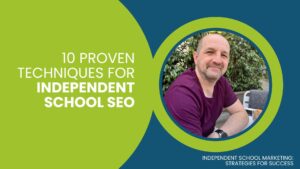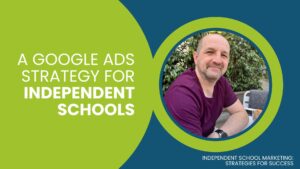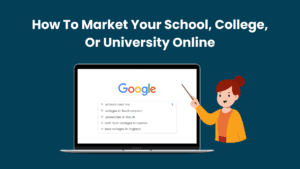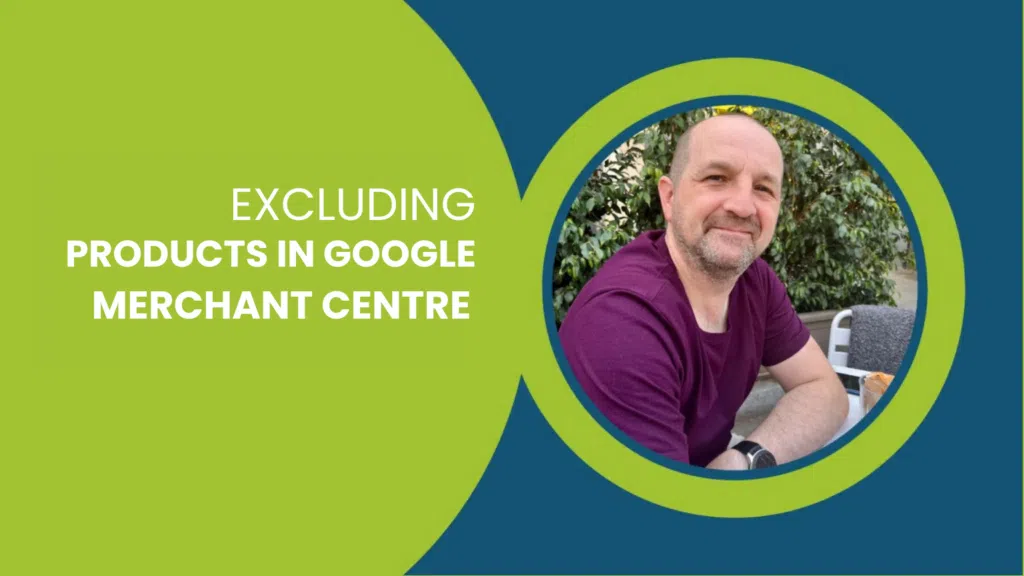In today’s digital landscape, having a well-optimised website is crucial for independent schools to boost their online visibility and attract prospective students and parents. Search Engine Optimisation (SEO) plays a vital role in improving organic search rankings and driving targeted traffic to your school’s website. In this post, we will explore effective SEO techniques specifically tailored for independent school websites to improve your school marketing strategy and enhance your online presence.
Table of contents
- Understanding the Importance of SEO for Independent Schools
- SEO Techniques for Independent School Websites
- 1. Conduct Comprehensive Keyword Research
- 2. Optimise On-Page Elements
- 3. Enhance User Experience (UX) and Site Performance
- 4. Create High-Quality, Relevant Content
- 5. Earn Quality Backlinks
- 6. Optimise for Local Search
- 7. Leverage Social Media
- 8. Monitor and Analyse Performance
- 9. Stay Up-to-Date with Algorithm Changes
- 10. Continuously Evolve and Adapt
- Additional Resources
- Conclusion
Understanding the Importance of SEO for Independent Schools
Before delving into SEO strategies, it’s essential to understand why SEO is crucial for independent school marketing. A well-optimised website can significantly improve your school’s visibility in search engine results, making it easier for parents and students to find you when searching for relevant keywords and phrases. By targeting specific search queries related to your school’s offerings, you can attract highly qualified organic traffic and increase the chances of conversions.
SEO Techniques for Independent School Websites
Implementing effective SEO techniques will help your school’s website rank higher in search engine results, boost organic traffic, and improve overall visibility. Here are some key techniques to consider:
1. Conduct Comprehensive Keyword Research
Start by conducting thorough keyword research to identify the search terms your target audience is using to find schools like yours. Focus on relevant keywords that align with your school’s offerings, such as “best independent schools in [location],” “private school admissions”, or “boarding schools with strong stem programs.” Use keyword research tools to discover high-volume, low-competition keywords that present opportunities for ranking.
Keywords are vital words or phrases representing your content. They help your website appear in relevant search results. For instance, “best independent schools in [location]” or “private school admissions” are valuable keywords. By using them in your content, headings, and meta tags, search engines connect your website with people searching for those terms and other variations of them – optimising your page for “best independent schools in [location]” is likely to also rank the same page for “independent schools in [location]”, “independent schools [location]”, “best private schools in [location]”. No, you don’t need a page for every variation of the search term.
When optimising, consider search volume, intent, and competition. For example, “top independent schools” has a higher average monthly search volume, while “IB curriculum benefits” reflects informational intent. Identifying keywords with high search volume and low competition, like “affordable independent schools,” helps improve visibility and attract organic traffic to your independent school website.
Learn more:
- Keyword Research and Analysis for SEO
- SEO Benefits of a Long-Tail Keyword Strategy
- 7 Awesome Keyword Research Tools for SEO
2. Optimise On-Page Elements
Optimise key on-page elements to make your website search engine friendly. This includes optimising meta titles, meta descriptions, and heading tags (H1, H2, H3) with relevant keywords. Ensure that each page has a unique title and description that accurately reflects its content. Incorporate targeted keywords naturally throughout the page, including in the body text, headings, and image alt tags.
By optimising meta titles, meta descriptions, and heading tags (H1, H2, H3) with relevant keywords, you increase the likelihood of search engines understanding the content and relevance of your web pages. When each page has a unique and accurately descriptive title and description, it becomes easier for search engines to index and display your pages in search results. Furthermore, strategically incorporating targeted keywords naturally throughout the page, including in the body text, headings, and image alt tags, helps search engines recognise the relevance and topic of your content.
Learn more: The Importance of Meta Titles and Descriptions in SEO
3. Enhance User Experience (UX) and Site Performance
A positive user experience is crucial for both website visitors and search engines. optimise your website’s loading speed, ensure mobile responsiveness, and make navigation intuitive. Improve overall site performance by compressing images, minifying CSS and JavaScript files, and implementing caching mechanisms. A fast-loading website with seamless navigation enhances user engagement and positively impacts search rankings.
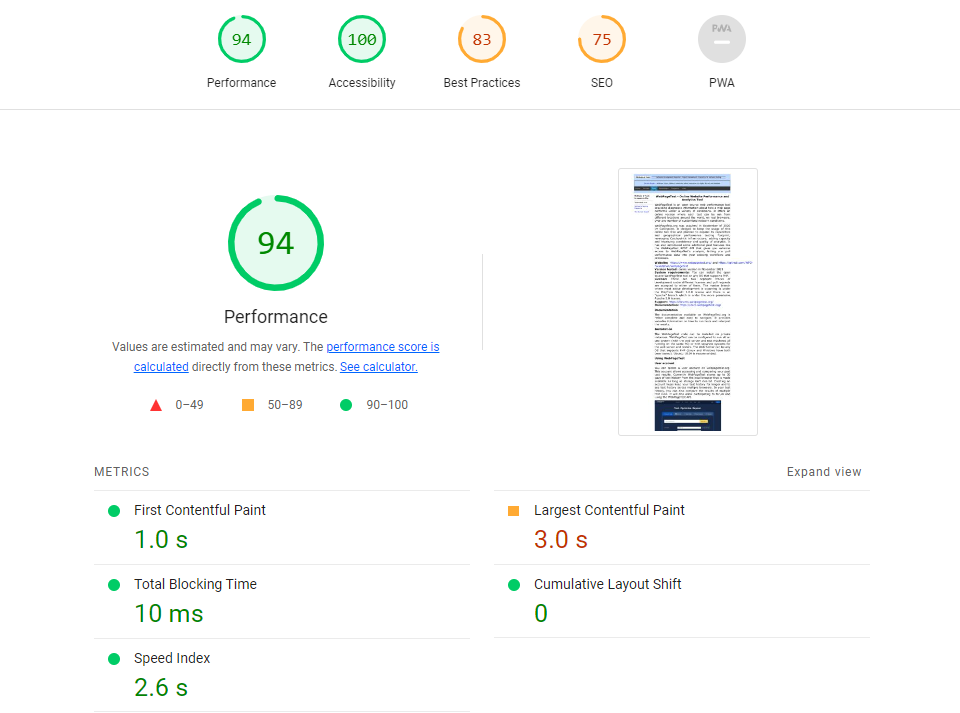
Page load speed is a fundamental aspect of providing a positive user experience on your website. It refers to the time it takes for a webpage to fully load its content and to be usable by a human visitor. Optimising your website’s page load speed involves implementing various techniques, such as optimising code, reducing file sizes, and leveraging browser caching. A fast-loading website not only improves user satisfaction but also signals to search engines that your site is efficient and user-friendly, contributing to better search rankings. You should aim for a page load time of 2 seconds or less.
Learn more:
4. Create High-Quality, Relevant Content
Produce high-quality, informative content that addresses the needs and interests of your target audience. Create engaging blog posts, articles, and resources that showcase your school’s expertise, unique programs, achievements, and educational philosophy. Incorporate targeted keywords naturally within your content and provide valuable information that educates and engages readers.
High-quality content plays a crucial role in SEO. By producing informative and engaging content, you attract and retain the attention of your target audience. Valuable content that addresses their needs and interests encourages longer dwell time, lower bounce rates, and increased social sharing. Search engines recognise these positive user signals, leading to better search rankings and visibility for your web pages.
High-quality content also provides a search engine with “topic density”. Topic Density refers to the frequency and relevance of a specific topic within your content. It involves strategically incorporating targeted keywords and related terms throughout your text. Maintaining an appropriate topic density helps search engines understand the main theme of your content and its relevance to users’ search queries.
Content that addresses informational search queries can rank prominently in search results and build trust in your brand. By creating valuable resources, blog posts, and articles that provide useful information and answer common questions, you position yourself as an authoritative source. This not only helps you rank for informational search terms but also establishes credibility and fosters trust with your target audience, leading to increased brand recognition and customer loyalty.
Key takeaway: create helpful content about your independent school, the surrounding location, student activities and the curriculum.
Learn more: Harnessing the Potential of Content Marketing for Independent Schools
5. Earn Quality Backlinks
Building a strong backlink profile is essential for improving your website’s authority and search rankings. Seek opportunities to earn quality backlinks from reputable sources such as educational websites, local directories, and relevant industry publications. Develop valuable content that others will want to link to, such as comprehensive guides, expert interviews, or insightful research.
Links play a crucial role in SEO, serving as votes of confidence and trustworthiness. Quality backlinks from reputable sources signal to search engines that your website is valuable and relevant. They contribute to improved search rankings, visibility, and organic traffic.
The value of links is measured based on several factors. Relevance is essential, as links from websites in the same industry or niche carry more weight. Authority and trustworthiness of the linking domain also influence the link’s value. Additionally, the anchor text used for the link and the placement within the content contribute to its significance. Quality and context are key in determining the value of links for SEO.
Domain authority is a metric that measures the overall strength and credibility of a website’s domain. It is assessed based on various factors, including the quality and quantity of incoming links, the website’s age, and its overall online reputation. Search engines consider domain authority when determining the trustworthiness and ranking potential of a website. A higher domain authority indicates a more authoritative and influential website, which positively impacts search rankings and organic visibility.
Key Takeaways: Links can be important for your page to rank when competing pages also have a strong link profile. Better, more relevant or more up to date content can sometimes overcome your page’s weaknesses in topic density and/or domain authority. If you are going to earn or build links, make sure that they’re from relevant pages and sites.
Learn more: 9 Link Building Techniques for SEO
Popular Education Marketing Videos
Popular Education Marketing Videos
6. Optimise for Local Search
For independent schools targeting specific geographic areas, optimising for local search is crucial. Create and optimise your Google My Business profile with accurate school information, including your address, phone number, and business hours. Encourage satisfied parents and students to leave positive reviews, as these can greatly influence local search rankings.
Google Business Profile is a powerful tool for local businesses, including independent schools, to enhance their online presence. It provides a detailed listing that appears in Google Maps and local search results. By creating and optimising your profile with accurate school information, contact details, and business hours, you increase your visibility to potential students and parents searching for schools in your area. It serves as a valuable platform for showcasing your school and attracting local enquiries.
Appearing in the “Maps Pack,” the prominent section displaying local search results on Google Maps, holds immense value for independent schools targeting specific geographic areas. Being featured in this section increases visibility and exposes your school to a highly engaged local audience actively seeking educational options. It provides an opportunity to stand out from competitors and generate more qualified leads, as users can easily access key information and contact your school directly.

The quantity, rating and recency of reviews have a significant impact on Google Maps rankings for independent schools. Positive reviews from satisfied parents and students not only contribute to a school’s reputation but also influence its position in local search results. Higher ratings and positive feedback signal to Google that your school is trustworthy and provides a positive experience. Encouraging and nurturing a strong base of positive reviews can boost your rankings, attract more prospective families, and establish credibility in the local community.
Key Takeaways: Optimise your Google Business Listing for relevance, but you should also work hard on earning as many 5-star reviews as you can to increase your rank and visibility in the Google Maps pack.
Learn more:
- Local SEO Guide: Everything You Need to Know
- Hire a Local SEO Agency
- Optimising Your Google My Business Listing
7. Leverage Social Media
Use social media platforms to promote your school and engage with your target audience. Share valuable content, announcements, and updates through social media channels. Engage in conversations, respond to comments and enquiries, and foster a sense of community. Social media signals can indirectly impact your website’s SEO by driving traffic, increasing brand visibility, and generating social shares which may lead to backlinks.
8. Monitor and Analyse Performance
Regularly monitor and Analyse your website’s performance using web analytics tools such as Google Analytics. Track key metrics like organic traffic, bounce rates, conversion rates, and keyword rankings. Gain insights into user behaviour, identify areas for improvement, and make data-driven decisions to optimise your SEO strategies continually.
9. Stay Up-to-Date with Algorithm Changes
Search engine algorithms are constantly evolving, and staying up-to-date with industry changes is crucial to maintain your website’s visibility. Stay informed about major algorithm updates, search engine guidelines, and best practices. Follow reputable SEO resources, participate in relevant forums and communities, and consider partnering with an experienced SEO agency for ongoing guidance.
Key algorithm changes you should be aware of:
- Google Panda (2011): Targeted low-quality and duplicate content, emphasizing the importance of high-quality, original content.
- Google Penguin (2012): Focused on penalising websites with manipulative link-building practices and spammy backlinks.
- Google Hummingbird (2013): Introduced semantic search and improved understanding of user intent, rewarding websites with relevant and comprehensive content.
- Google Mobile-Friendly Update (2015): Prioritised mobile-friendly websites in mobile search results to enhance user experience on smartphones and tablets.
- Google RankBrain (2015): Utilised artificial intelligence to better understand complex search queries and provide more relevant results.
- Google Helpful Content Update (2022): Focuses on ensuring people see more original, helpful content written by people, for people, in search results.
Learn more: Every Google Algorithm Update You Need to Know About
10. Continuously Evolve and Adapt
SEO is an ongoing process, and it’s important to continuously evolve and adapt your strategies. Regularly review your keyword research, content performance, and website analytics. Experiment with new techniques, test different approaches, and refine your SEO strategies based on data and results.
Additional Resources
For further information and resources on SEO techniques for independent schools, you can explore the following links:
- SEO for Schools: 10 Critical Steps: A comprehensive guide to SEO strategies specifically designed for schools.
- SEO Agency for Schools: Discover the benefits of partnering with an SEO agency for your school’s marketing efforts.
- Digital Marketing for Schools: Explore Tillison Consulting’s digital marketing services tailored for schools.
Conclusion
Implementing effective SEO techniques for your independent school’s website is essential to enhance your online visibility, attract targeted organic traffic, and increase your school’s competitiveness. By conducting comprehensive keyword research, optimising on-page elements, improving user experience, creating valuable content, earning quality backlinks, and staying up-to-date with SEO trends, you can boost your school’s visibility and attract prospective students and parents.
Remember that SEO is an ongoing process, and continuous monitoring, analysis, and adaptation are key to maintaining and improving your search rankings over time. By consistently implementing these SEO techniques, you can position your independent school for success in the digital landscape.
[subscribe]

